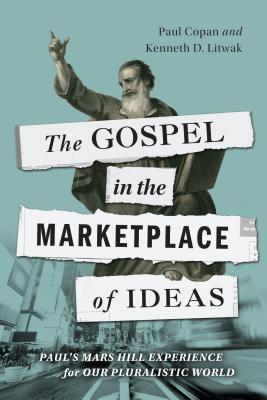 The Gospel in the Marketplace of Ideas: Paul’s Mars Hill Experience for Our Pluralistic World
The Gospel in the Marketplace of Ideas: Paul’s Mars Hill Experience for Our Pluralistic World
By Paul Copan and Kenneth D. Litwak
My rating: 4 of 5 stars
Relevance and faithfulness. Any teacher of any religious tradition is faced with this tension as they move from one cultural context to the next. One has to connect both with the thought world and life experiences of one’s hearers in terms they readily grasp, and one needs to faithfully communicate the substance of one’s religious beliefs without compromising their essence.
The authors of this book believe the Apostle Paul’s Mars Hill discourse provides a very helpful model for how one may do this in the case of Christianity. Athens represented the intellectual center of the Roman empire and was a crossroads of the various beliefs commonly held in Paul’s day from the worship of a pantheon of deities to the more refined philosophies of Epicureanism and Stoicism. The authors observe how this is not unlike our own context which they see steeped in both post-modernist assumptions about truth and materialistic naturalism. (I am surprised that they did not give more attention to Eastern influences in our society and the pantheistic monism that characterizes many discussions of “spirituality.”)
One of the first questions the authors answer is whether Paul succeeded in this task. Some commentators have argued that Athens represented a failed strategy of “contextualized preaching” from which Paul retreated when he went on to Corinth and decided to preach nothing but “Jesus Christ and him crucified.” They show how Paul’s message, while using the language and letters of the Greeks, actually reflected ideas rooted both in the Hebrew scriptures and the preaching of Christ elsewhere. And, like elsewhere, some believed while others did not. There were many other cities, like Philippi that Paul left with just handfuls of believers.
Through a detailed study of the content and rhetoric of Paul’s message, the authors show that Paul knew his audience, knew their leading thinkers, and framed the gospel in terms they could grasp, yet without shrinking away from controversial contentions, most notably, the idea of the resurrection. They conclude that we may also pay attention to the instances of “unknown gods” in our culture, the signals of awareness of the transcendent in our hearers, the process people undergo in their journey to faith, and the important work we may need to do in challenging the idolatries of our day. Ultimately we must also point to Jesus as the climax of history and the one who fulfills in his life, death, and resurrection our highest ideals.
This is a helpful contribution to the discussion of Paul’s Mars Hill message and whether it may serve as a model for contemporary Christian witness. The authors not only defend this contention but show in very practical terms how this might work out in a twenty-first century context.
Thank-you to Bob for sharing The Gospel in the Marketplace of Ideas: Paul’s Mars Hill Experience for Our Pluralistic World from his blog Bob on Books. As you may remember, Kenneth D. Litwak wrote an excellent three part Scholar’s Compass series on Bible-Believing Biblical Scholar: Integrating Christian Faith and Biblical Scholarship. Be sure to stay tuned for an author interview with regard to The Gospel in the Marketplace of Ideas. Thank-you Ken! To God be the glory! ~ Thomas B. Grosh IV, Associate Director, Emerging Scholars Network
Bob Trube is Associate Director of Faculty Ministry and Director of the Emerging Scholars Network. He blogs on books regularly at bobonbooks.com. He resides in Columbus, Ohio, with Marilyn and enjoys reading, gardening, choral singing, and plein air painting.

Leave a Reply